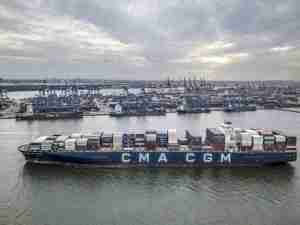Transpacific container shippers plans freight rate rise
By: Reuters | Jan 28 2014 at 03:33 PM | Maritime
Container shipping lines have agreed to raise Asia-U.S. freight rates in two stages, by $300 per 40-foot container (FEU) from March 15 and then by an unknown amount from May 1, in an effort to halt losses, their organisation TSA said.
The members of the TSA (Transpacific Stabilization Agreement) include 15 of the world’s biggest container shipping lines such as Denmark’s Maersk Line, a unit of A.P. Moller-Maersk, privately owned Switzerland-based Mediterranean Shipping Company (MSC), French privately held CMA CGM, China’s COSCO, Korea’s Hanjin Shipping and others.
A Jan. 15 general rate increase taken by member lines in the TSA has added an average $300 per 40-foot container to rate levels.
According to TSA, strong forward bookings suggest that the increase will hold through the important Chinese Lunar New Year period.
“And lines intend to build on the momentum with another $300 per FEU increase, effective March 15, and a further May 1 increase,” TSA said in a statement.
The rate increase with effect May 1 has to be determined by shipping companies.
Spot freight rates are calculated and published every week by Shanghai Shipping Exchange. Last week rates for transport of 40-foot containers from Asia to U.S. West Coast stood at $4,220.
Executive administrator Brian Conrad from TSA acknowledged the difficulty of raising rates in a highly competitive market, but said carriers have left a lot of money on the table in this market as partially successful increases have been eroded over time.
“There is now a growing sense that pent-up demand, depleted retail and business inventories, and a greater overall sense of economic security are converging in 2014. Lines are determined not to miss that opportunity” Contrad said in the statement.
Freight rates plunged to loss-making levels in 2013 as a result of overcapacity in the market.
Founded in 1989, the TSA calls itself a “research and discussion forum of major container shipping lines” serving the trade from Asia to the United States.
Liner shipping was previously organised in similar groups called “liner conferences” which met to discuss market conditions, freight rates and other common concerns.
But the European Union decided in 2006 to ban the practice as against competition rules and the ban took effect in 2008.








